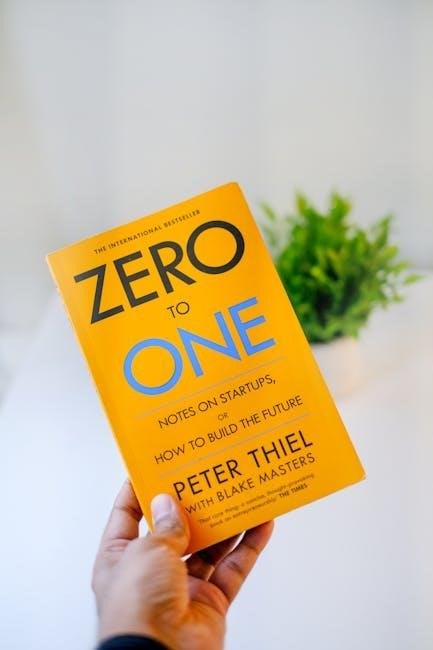In Zero to One‚ Peter Thiel and Blake Masters explore entrepreneurship‚ innovation‚ and creating value․ Thiel‚ a renowned entrepreneur‚ challenges conventional wisdom on progress and future-building․
Overview of the Book’s Main Theme
In Zero to One‚ Peter Thiel and Blake Masters delve into the essence of entrepreneurship and innovation‚ advocating for the creation of unique value․ The book challenges the notion of a technologically stagnant society‚ emphasizing the potential for groundbreaking progress․ Thiel argues that true innovation occurs when businesses move from “zero to one‚” creating something entirely new rather than incrementally improving existing ideas․ He critiques the mindset of competition and instead promotes the importance of monopolies and contrarian thinking as drivers of success․ The central theme is a call to action for entrepreneurs to think boldly‚ challenge conventional wisdom‚ and build companies that redefine the future․ This philosophy serves as a blueprint for fostering innovation and creating lasting impact․
Peter Thiel’s Vision for the Future
Peter Thiel envisions a future driven by radical innovation‚ where entrepreneurs create entirely new industries rather than competing in saturated markets․ He argues that technological stagnation can be overcome by fostering a mindset that embraces contrarian thinking and long-term vision․ Thiel believes that companies should aim to establish monopolies by solving unique problems‚ thereby creating unparalleled value․ His vision emphasizes the importance of bold risks‚ challenging conventional wisdom‚ and prioritizing substance over branding․ By encouraging startups to focus on transformative ideas‚ Thiel aims to unlock humanity’s potential and ensure a future marked by progress and prosperity․
Key Concepts Explored in “Zero to One”
Zero to One explores creating unique value‚ contrarian thinking‚ and the importance of innovation over competition․ Thiel emphasizes building monopolies and solving problems others overlook․
The Idea of Going from Zero to One
Peter Thiel’s concept of “going from zero to one” emphasizes creating something entirely new rather than incrementally improving existing ideas․ This philosophy challenges entrepreneurs to think differently‚ focusing on innovation that solves unaddressed problems or taps into unexplored markets․ Thiel argues that true progress comes from making significant leaps‚ not marginal advancements․ By encouraging a mindset shift from competition to uniqueness‚ “zero to one” inspires the creation of groundbreaking products and services that redefine industries․ This idea is central to Thiel’s vision for fostering a future driven by innovation and value creation․
Contrarian Thinking and Innovation
Peter Thiel emphasizes the power of contrarian thinking as a catalyst for innovation․ He argues that true breakthroughs often arise from challenging conventional wisdom and embracing unconventional ideas․ Thiel contends that entrepreneurs should seek to solve problems others overlook or undervalue‚ rather than following established trends․ By thinking differently‚ innovators can create unique solutions that establish new markets or disrupt existing ones․ This approach encourages boldness and uniqueness‚ which Thiel believes are essential for creating lasting value․ Contrarian thinking‚ combined with a focus on solving real problems‚ is central to Thiel’s vision for fostering innovation and building a better future․

The Author’s Background and Expertise
Peter Thiel‚ co-founder of PayPal and Palantir‚ is a visionary entrepreneur and investor․ His expertise spans technology‚ startups‚ and innovation‚ making him a trusted authority on building successful companies․
Peter Thiel’s Entrepreneurial Journey
Peter Thiel‚ a visionary entrepreneur and investor‚ co-founded PayPal‚ revolutionizing online payments‚ and later Palantir‚ a data analytics company․ His entrepreneurial journey began with PayPal‚ which he sold to eBay for $1․5 billion․ Thiel then focused on Palantir‚ leveraging data to solve complex problems․ As an investor‚ he backed Facebook and SpaceX‚ shaping the future of technology․ Thiel’s teachings at Stanford’s CS183 class inspired Blake Masters to co-author Zero to One․ His journey reflects a commitment to innovation and challenging the status quo‚ emphasizing the importance of creating new value rather than replicating existing models․ Thiel’s insights have profoundly influenced modern entrepreneurship and technological advancement․
Blake Masters’ Contribution to the Book
Blake Masters‚ a former student of Peter Thiel‚ played a pivotal role in shaping Zero to One by transforming Thiel’s Stanford lectures into a structured manuscript․ His detailed notes from Thiel’s CS183 class served as the foundation for the book‚ capturing the essence of Thiel’s teachings on entrepreneurship and innovation․ Masters’ ability to organize and refine these ideas ensured the book’s clarity and accessibility‚ making it a valuable resource for entrepreneurs and innovators․ His collaborative efforts with Thiel were instrumental in bringing the visionary concepts to life‚ offering practical insights and challenging readers to think differently about the future․ Masters’ contribution was essential in translating Thiel’s ideas into a cohesive narrative․
Central Arguments of the Book

Peter Thiel argues that true progress comes from creating new things‚ not copying others․ He emphasizes the importance of monopolies in fostering innovation and profitability․ Challenging technological stagnation‚ Thiel advocates for bold thinking to shape the future․
The Importance of Monopolies in Business
In Zero to One‚ Peter Thiel argues that creating a monopoly is essential for business success․ Unlike competitive markets‚ monopolies allow companies to innovate freely and capture long-term value․ Thiel contends that true monopolies are not harmful but rather a sign of unique value creation․ By dominating a specific niche‚ businesses can avoid fierce competition and focus on advancing technology․ This perspective challenges traditional views of monopolies‚ framing them as drivers of progress rather than obstacles․ Thiel’s vision emphasizes the importance of building companies that can sustainably lead their markets‚ fostering innovation and securing a prosperous future․
Challenging the Notion of Technological Stagnation
Peter Thiel challenges the belief that society is rapidly advancing technologically․ He argues that while digital innovation has flourished‚ progress in areas like medicine‚ energy‚ and transportation has stalled․ Thiel contends that true innovation involves creating entirely new technologies‚ not just improving existing ones․ He criticizes the mindset that assumes progress is inevitable‚ emphasizing that breakthroughs require bold thinking and contrarian ideas․ By questioning technological stagnation‚ Thiel encourages entrepreneurs to focus on solving fundamental problems rather than pursuing incremental advancements․ This perspective underscores his belief in the potential for radical innovation to transform industries and create a better future․

Practical Insights for Startups
Zero to One offers actionable advice for startups‚ emphasizing innovation‚ monopolies‚ and solving real problems․ Thiel’s seven questions guide entrepreneurs to build unique‚ scalable businesses that create lasting value․
Seven Questions Every Startup Should Answer
In Zero to One‚ Peter Thiel outlines seven critical questions startups must address to succeed:
Can you create breakthrough technology?
Is now the right time?
Are you starting with a big share of a small market?
Do you have a way to deliver your product?
Will your business last?
Do you have the right team?
Do you have a unique monopoly?
These questions guide entrepreneurs to focus on innovation‚ scalability‚ and long-term value creation‚ helping them avoid competition and build enduring companies․
Building Companies That Create New Value
According to Zero to One‚ true innovation lies in creating new value rather than replicating existing ideas․ Peter Thiel emphasizes that successful companies invent products or services that didn’t exist before‚ addressing unmet needs․ This approach fosters monopolies‚ allowing businesses to dominate niche markets and avoid competition․ By focusing on unique solutions‚ startups can capture lasting value‚ ensuring long-term success․ Thiel’s philosophy encourages entrepreneurs to think boldly and challenge conventional industries‚ driving progress and shaping the future․

Reception and Impact of “Zero to One”
Zero to One has profoundly influenced entrepreneurship‚ sparking global discussions on innovation and value creation․ Its insights have shaped startup strategies‚ inspiring founders and investors to rethink progress․
How the Book Has Influenced Entrepreneurship
Zero to One has reshaped entrepreneurial thinking‚ encouraging founders to pursue unique value creation over competition․ By challenging conventional wisdom‚ it has inspired a generation to think differently about innovation‚ monopolies‚ and the future․ The book’s emphasis on solving real problems and creating new markets has become a guiding principle for startups worldwide․ Its influence extends beyond Silicon Valley‚ fostering a global movement toward bold‚ contrarian ideas․ Many entrepreneurs credit the book with altering their approach to business‚ emphasizing long-term vision and differentiation․ As a result‚ Zero to One has become a foundational text for anyone aiming to build a transformative company․

Key Lessons for Innovators and Investors
Zero to One offers invaluable insights for innovators and investors‚ emphasizing the importance of identifying underserved markets and creating monopolies․ Thiel argues that true innovation comes from solving problems others overlook‚ rather than competing in saturated industries․ Investors are encouraged to seek companies with unique value propositions and long-term potential․ The book also highlights the need for contrarian thinking‚ urging entrepreneurs to challenge conventional wisdom and take bold risks․ By focusing on scalability and sustainable growth‚ Zero to One provides a roadmap for building companies that create lasting impact․ These lessons have become essential for anyone aiming to drive meaningful change in the business world․
Zero to One leaves readers with a profound understanding of innovation and entrepreneurship․ Thiel’s insights inspire creating new value and challenging the status quo for a better future․
The Lasting Legacy of “Zero to One”

Zero to One has left an indelible mark on entrepreneurship and innovation․ Peter Thiel’s visionary ideas have reshaped how startups approach growth and monopolies‚ emphasizing contrarian thinking and long-term value creation․ The book’s influence extends beyond Silicon Valley‚ inspiring a global shift in business strategies․ Its emphasis on questioning conventional wisdom and fostering unique solutions continues to guide innovators and investors alike․ As a testament to its impact‚ Zero to One remains a cornerstone in entrepreneurial literature‚ driving future generations to think boldly and create transformative technologies․ Its legacy endures as a powerful roadmap for building the future․